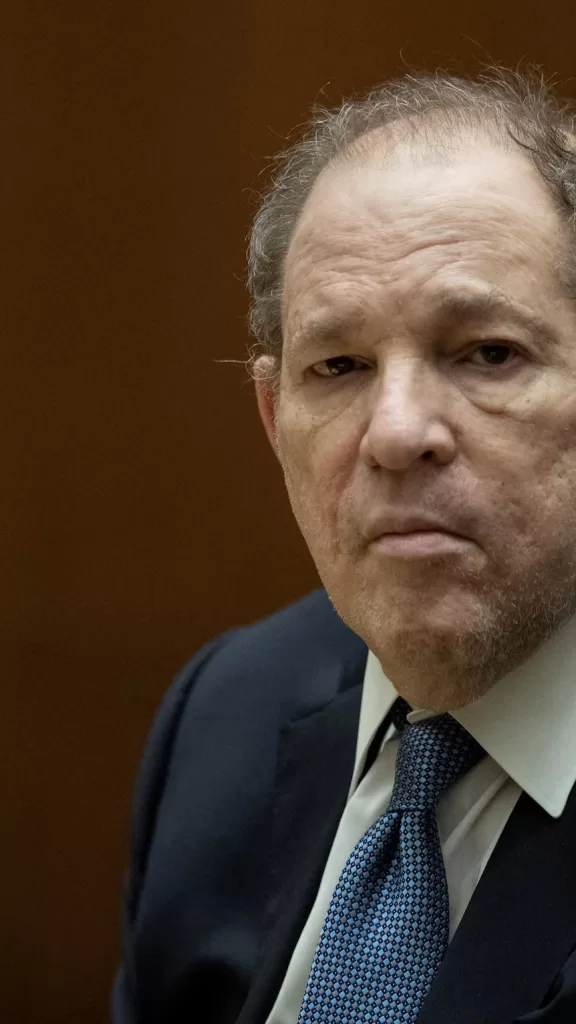New York’s highest court has overturned Harvey Weinstein’s 2020 rape conviction, finding the judge at the landmark #MeToo trial prejudiced the ex-movie mogul with “egregious” improper rulings
In a 4-3 decision, the state Court of Appeals said the trial judge made a mistake by letting prosecutors introduce testimony from women who claimed that Weinstein assaulted them, even though they were not part of the charges he faced.
The appeals court also said the trial judge compounded the error by letting Weinstein be cross-examined in a way that portrayed him in a “highly prejudicial” light.
“The remedy for these egregious errors is a new trial.”
The state ruling reopens a painful chapter in America’s reckoning with sexual misconduct by powerful figures — an era that began in 2017 with a flood of allegations against Weinstein.
His accusers could again be forced to relive their traumas on the witness stand.
The court’s majority said “it is an abuse of judicial discretion to permit untested allegations of nothing more than bad behaviour that destroys a defendant’s character but sheds no light on their credibility as related to the criminal charges lodged against them.”
In a stinging dissent, Judge Madeline Singas wrote that the majority was “whitewashing the facts to conform to a he-said/she-said narrative,” and said the Court of Appeals was continuing a “disturbing trend of overturning juries’ guilty verdicts in cases involving sexual violence.”
“The majority’s determination perpetuates outdated notions of sexual violence and allows predators to escape accountability,” Ms Singas wrote.
Weinstein, 72, has been serving a 23-year sentence in a New York prison following his conviction on charges of criminal sex act for forcibly performing oral sex on a TV and film production assistant in 2006 and rape in the third degree for an attack on an aspiring actress in 2013.
He will remain imprisoned because he was convicted in Los Angeles in 2022 of another rape and sentenced to 16 years in prison. Weinstein was acquitted in Los Angeles on charges involving one of the women who testified in New York.
“We all worked very hard and this is a tremendous victory for every criminal defendant in the state of New York,” Weinstein’s lawyer Arthur Aidala said on the ruling.
Lawyers for the women who accused Weinstein in the New York case did not immediately return messages Thursday.
Weinstein’s lawyers argued Judge James Burke’s rulings in favour of the prosecution turned the trial into “1-800-GET-HARVEY”.
Trial drew publicity amid #MeToo movement
The reversal of Weinstein’s conviction is the second major #MeToo setback in the last two years, after the US Supreme Court refused to hear an appeal of a Pennsylvania court decision to throw out Bill Cosby’s sexual assault conviction.
Weinstein’s conviction stood for more than four years, heralded by activists and advocates as a milestone achievement, but dissected just as quickly by his lawyers and, later, the Court of Appeals when it heard arguments on the matter in February.
Allegations against Weinstein, the once powerful and feared studio boss behind such Oscar winners as Pulp Fiction and Shakespeare in Love, ushered in the #MeToo movement.
Dozens of women came forward to accuse Weinstein, including famous actresses such as Ashley Judd and Uma Thurman.
His New York trial drew intense publicity, with protesters chanting “rapist” outside the courthouse.
Weinstein maintains his innocence. He contends any sexual activity was consensual.
Mr Aidala argued before the appeals court in February that Mr Burke swayed the trial by allowing three women to testify about allegations that were not part of the case and by giving prosecutors permission to confront Weinstein, if he had testified, about his long history of brutish behaviour.
Mr Aidala argued the extra testimony went beyond the normally allowable details about motive, opportunity, intent or a common scheme or plan, and essentially put Weinstein on trial for crimes he was not charged with.
Weinstein wanted to testify, but opted not to because Mr Burke’s ruling would have meant answering questions about more than two-dozen alleged acts of misbehaviour dating back four decades, Mr Aidala said.
Mr Aidala also took issue with Mr Burke’s refusal to remove a juror who had written a novel involving predatory older men, a topic the defence lawyer argued too closely resembled the issues in Weinstein’s case.
A lawyer for the Manhattan district attorney’s office, which prosecuted the case, argued that the judge’s rulings were proper and that the extra evidence and testimony he allowed was important to provide jurors context about Weinstein’s behaviour and the way he interacted with women.
The Court of Appeals agreed last year to take Weinstein’s case after an intermediate appeals court upheld his conviction.
Prior to their ruling, judges on the lower appellate court had raised doubts about Mr Burke’s conduct during oral arguments.
One observed that Mr Burke had let prosecutors pile on with “incredibly prejudicial testimony” from additional witnesses.
Mr Burke’s term expired at the end of 2022. He was not reappointed and is no longer a judge.
In appealing, Weinstein’s lawyers sought a new trial, but only for the criminal sexual act charge.
They argued the rape charge could not be retried because it involves alleged conduct outside the statute of limitations.
AP/ Reuters
Posted , updated
